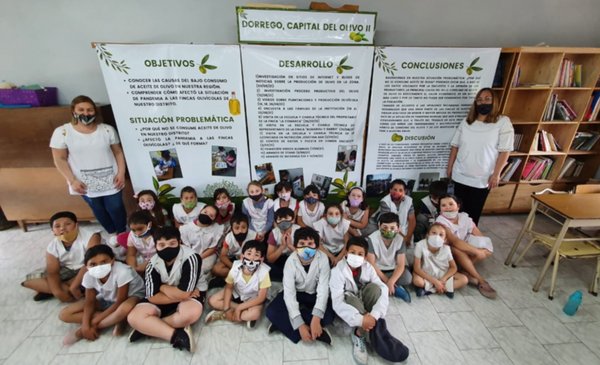The “Dorrego, Capital del Olivo II” project led the boys and girls of third grades A and B from General Manuel Belgrano Elementary School in this district to overcome several cases at the science fair until they were selected to appear in the national edition.
It should be noted that for the national sample, only two projects were selected from each district in the province of Buenos Aires.
The two consulting educators on the project, Leticia Mirales and Vanessa Marques, commented that, along with another project designed by Coronel Pringles, they will be representatives of District XXI at the 2021 National Science, Art, and Technology Fair.
Small and young Dorregians’ proposal has continued with work begun in 2019 by another group that could not continue due to the pandemic, since last year the science fair has been suspended.
“This year came up to continue the project but with a different approach,” said Vanessa Marques. “In the classroom, in the discussions, researchable questions have emerged related to what is currently happening with the olive tree.”
“The students agreed that not everyone consumes olive oil at home, and some families don’t know it. That’s why we asked ourselves: Why not consume more olive oil?” he said.
“Recognizing that in our region it is a strong development activity and that the epidemic affected all institutions, we asked ourselves: has the epidemic affected olive plantations? In what way?”
Students participated in a live instance of the Coronel Dorrego (face to face) and in a virtual regional instance where the group representatives explained their work through videos and live broadcasts to the residents. There they went to the interrupt instance.
He stressed that “our role as educators has been that of advisors, that is, to facilitate tools so that they can develop their interests and bring children closer to learning.”
Exhibition projects should be related to the current year’s content, in this case from social sciences, production process and plants from natural sciences.
Once the research topic is identified, it is necessary to make it problematic. In other words, what aspect of knowledge will be worked on, presented as a question. Narrowing and defining the problem is one of the most important parts of the research work. Here the context of the situation plays an important role, and this project represents our region in particular.
The national sample will be from November 29th. From each district, two projects will represent the district.
“The entire community is very happy with the news, from our managers who supported us unconditionally to the families who actively participated, helped, collaborated and supported every idea that arose, as well as the municipality who gave us advice and support,” said Leticia Mirales.
“Our school is 104 years old, every day we work with the conviction that children are the answer and we have to guarantee their rights,” Freire said: “Education does not change the world: it changes the people who will change the world.”

“Social media evangelist. Student. Reader. Troublemaker. Typical introvert.”

:quality(85)/cloudfront-us-east-1.images.arcpublishing.com/infobae/TEQF6EONZRFGLLLDIDD4L2O4EE.jpg)

:quality(75)/cloudfront-us-east-1.images.arcpublishing.com/elcomercio/XU32LRAEZFDDPNVHLFU3CKVBYY.jpg)



More Stories
Venezuela ranks fourth in female leadership in science and technology in Latin America
In Portuguesa and Sucre they explore the wonderful world of science
The university court overturns the expulsion of two teachers and a chemical sciences student